Definitive distribution agreement for a minimum of 4,000 kits until December 2027
Represents VivoPower’s largest distribution deal to date for Tembo kits
Definitive agreement increases total commitments and orders to over 10,000 kits
Heralds Tembo’s entry into 2nd hand vehicle repowering market
Total addressable market for 2nd hand vehicle repowering estimated to be worth $110 bn*
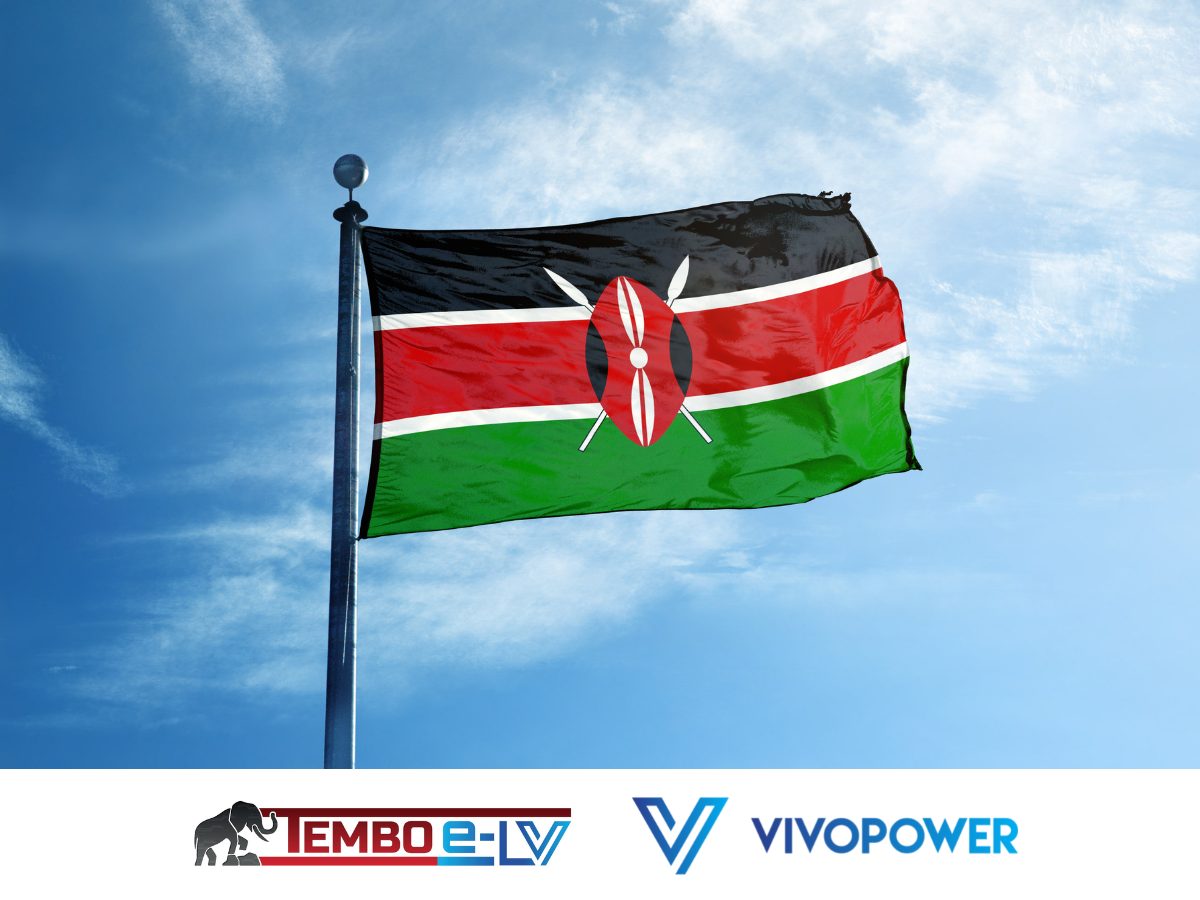
VivoPower is pleased to announce that the Company and its wholly-owned subsidiary, Tembo e-LV B.V. (“Tembo”), have entered into a Definitive Distribution Agreement with Energy Trading Company Mauritius (“ETC Mauritius”) to sell, distribute and market Tembo electrification conversion kits for Toyota 4x4 second-hand vehicles in the Republic of Kenya.
Under the agreement, ETC Mauritius has committed to sell a minimum of 4,000 Tembo e-LV conversion kits from execution of this agreement until 31st December 2027 across various industry sectors in Kenya. ETC Mauritius will be responsible for acquiring Toyota second-hand vehicles, converting the vehicles to ruggedised e-LVs using Tembo solutions, selling the units to end-customers and providing after-sale servicing and maintenance with support from Tembo.
This agreement marks VivoPower’s largest distribution deal to date for Tembo e-LV conversion kits, based on number of kits. Sectors where the Tembo e-LVs will be used are wide-ranging, including government services, agriculture, tourism and mining. Importantly, VivoPower is also entering the second-hand vehicle market, which represents a considerably larger addressable market than that for conversion of new vehicles and allows for on-road applications of our e-LV kit.
Tembo’s conversion kits transform diesel-powered Toyota Land Cruiser and Hilux vehicles into ruggedised electric light vehicles for use in mining and other hard-to-decarbonise sectors. Tembo e-LV products are a key component of VivoPower’s turnkey net-zero solutions to assist both government and corporate enterprises accelerate towards their decarbonisation goals.
Kevin Chin, Executive Chairman and CEO of VivoPower, said: “We are delighted to announce this distribution partnership with ETC, given their longstanding and deep ties with both government and the private sector in Kenya. This partnership is a landmark milestone for Tembo e-LV on two fronts: it represents our single largest commitment of future orders for Tembo e-LV conversion kits at all levels within a single country and importantly it heralds our entry into the second-hand vehicle repowering market, which effectively multiplies our total addressable market. We look forward to working closely with the ETC team to deliver our solutions to Kenya, assisting both government and private sector achieve their energy transition goals over the next five years and beyond.”
Sacha E Cook, CEO of ETC Mauritius, said: “We are delighted to become a distributor of Tembo e-LVs in Kenya, which will allow us to play a significant role in achieving our country’s net zero targets by 2030. Having evaluated a number of alternatives, we decided to partner with Tembo, with which we can lead the way to decarbonise key sectors, including mining, public sector, agriculture and tourism across the country. We look forward to becoming part of the Tembo e-LV family and building a solid partnership in the coming years.”
To read the full article, and to keep up with all releases, visit VivoPower’s Press Releases page.
About VivoPower
VivoPower is an award-winning global sustainable energy solutions company focused on battery storage, electric solutions for customised and ruggedised fleet applications, solar and critical power technology and services. The Company's core purpose is to provide its customers with turnkey decarbonisation solutions that enable them to move toward net-zero carbon status. VivoPower is a certified B Corporation with operations in Australia, Canada, the Netherlands, the United Kingdom, the United States, and the United Arab Emirates.
About ETC Mauritius
Energy Trading Company Mauritius currently has investments and operations in clean energy (50% of Rift Gas Ltd, Kenya) and micro mobility company (SKOOT, United Kingdom). The fundamental principle and driving force of the business and its investment portfolio is to contribute to achieving Net Zero across the clean energy and transport sectors.
All trademarks referenced herein are the property of their respective owners.
* Source: VivoPower estimate
Contact
Shareholder Enquiries
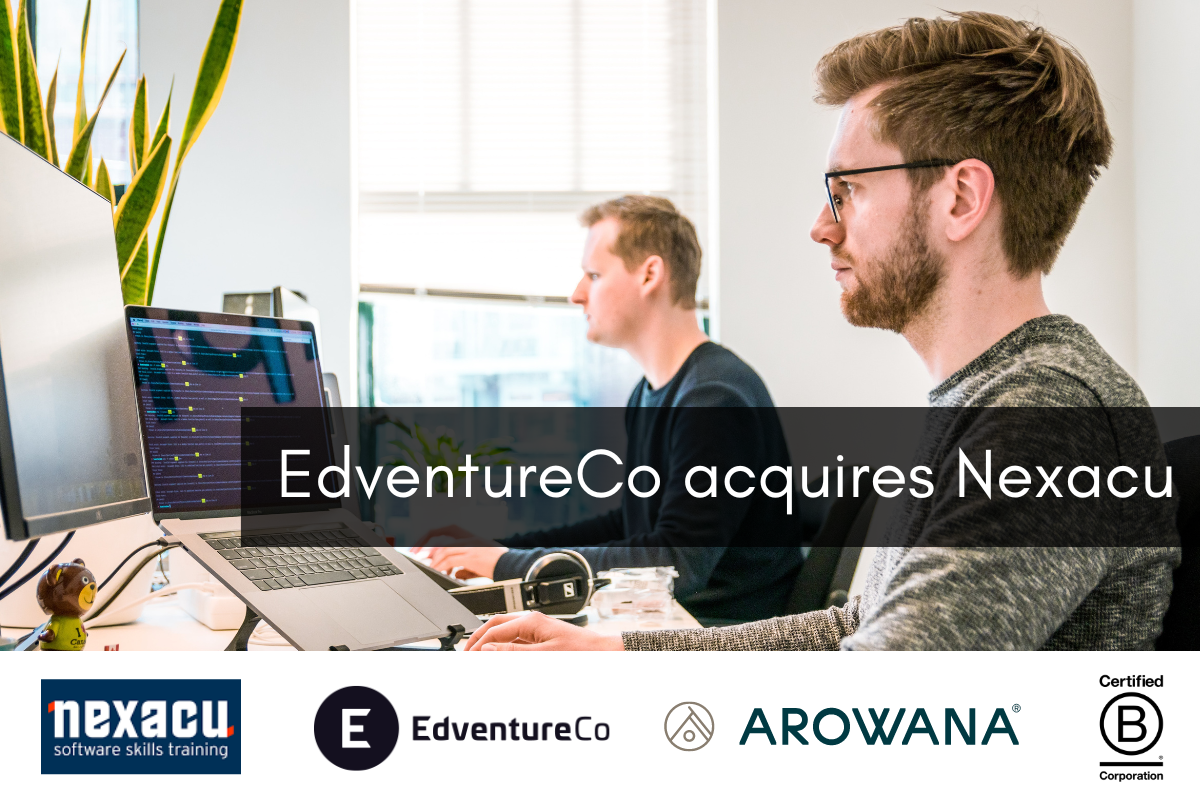
EdventureCo, the education platform of award-winning impact investment firm and global B Corp, Arowana, has acquired Australia-based Microsoft Application training provider Nexacu in a deal worth $A19.1 million.
EdventureCo’s acquisition of Nexacu is in line with the company’s continued expansion of DDLS. The corporate ICT and digital skills training provider now includes DDLS Australia, DDLS Philippines, The Australian Institute of ICT, Auldhouse, and DDLS People. It follows DDLS’s acquisition of Auldhouse for $A16.6 million in 2021.
With Nexacu now part of its business, DDLS cements its position as the leading provider of digital skills training across APAC. The acquisition also allows the company to continue its significant contribution to reducing the critical digital skills gaps seen across the region.
Jon Lang, Chief Executive Officer of DDLS, believes the deal brings the training prowess of DDLS and Nexacu together. Both companies are committed to innovative technology, up-skilling the technical workforce, and advancing end-user capabilities.
“This will be a perfect union in terms of market adjacency and expansion. We both provide live, instructor-led, digital skills training, with DDLS focusing on technical courses for IT professionals, and Nexacu end-user apps courses,” Lang said.
“Given our growing portfolio of digital products and flexible delivery modalities there will be some great opportunities to continue building out this capability with Nexacu’s product suite.”
Meanwhile, Nexacu cofounder Paul Panebianco said he was positive for the future of the company under the DDLS umbrella.
“I'm delighted that Nexacu has joined the DDLS family, becoming part of the leading digital skills provider in the APAC region. There will be some great benefits for our customers and employees with opportunities to leverage synergies across sales, marketing, and product, in addition to their world-class facilities,” Panebianco said.
“By combining our expertise, we will create stronger, more impactful training options for both organisations and skilled workers across APAC. Both Anita and I couldn't be more excited about what lies ahead for Nexacu, our customers, and employees.”
A Leader in Microsoft End-User App Training
As a Microsoft Gold Partner, Nexacu has established itself as a leading provider of quality Microsoft end-user app training with campuses across Australia. The company currently has a highly diversified customer base across government, education, and commercial sectors, generating more than 42,000 positive participant reviews.
Today, Nexacu trains 13,000 students per annum and the merger will grow DDLS’s training pool to more than 30,000 students each year.
In acquiring Nexacu, DDLS intends to bolt-on the company’s portfolio of end-user courses to its enterprise sales infrastructure.
For more information on EdventureCo and its business units, visit www.edventureco.com.
‘Our vision is to become a quadruple bottom-line company that empowers communities,’ says Rommel Benig, Founder and CEO of Green Antz

Green Antz (GA), the initial investment of award-winning impact investing firm Arowana Impact Capital, has been named the top Pollution Reduction Initiative at the Environmental Finance Sustainable Company Awards 2022. The recognition represents a new milestone on GA’s journey towards a circular economy.
As one of the fastest-growing pollution reduction service providers in Asia, GA partners with local communities and corporations in the Philippines in collecting and converting low-value plastics into eco-friendly, durable, and affordable construction materials such as eco-bricks and pavers.
Environmental Finance recognised Green Antz for its:
GA aims to convert about 6,000 tonnes of plastic each year through 1,000 collection points that employ members of local communities.
While most recycling plants in the Philippines treat rigid plastics, Green Antz has set out to convert multi-layer plastic packaging such as sachets.
“Sachets don’t have any commercial value,” Green Antz CEO Rommel Benig said. “They’re not being recycled.”
This gave Rommel, who is an engineer by profession, the idea to establish a social enterprise focused on green initiatives tackling the Philippines’ sachet economy.
“We decided to embrace and eventually also pioneer the circular economy model in the Philippines. That was really the awakening and the inspiration behind why I started doing this,” he said.
“We are setting up our Eco-hubs across the country, in different locations, so that we can collect the plastics directly from the communities and also build a model that's socially inclusive,” Rommel said.
“We are addressing environmental problems associated with plastics and other solid waste and – at the same time – creating livelihood at a grassroots level. This is really part of our vision to become a quadruple bottom-line company where we are pursuing not just profit but also empowering people that have a purpose.”
In March 2022, AIC completed its cornerstone investment in Green Antz. The investment allows GA to tackle Asia’s burgeoning plastic waste problem, whilst offering cost-effective and environmentally responsible alternatives to traditional building materials.
Visit the Environmental Finance website for the full list of Sustainable Company Awards 2022 winners.
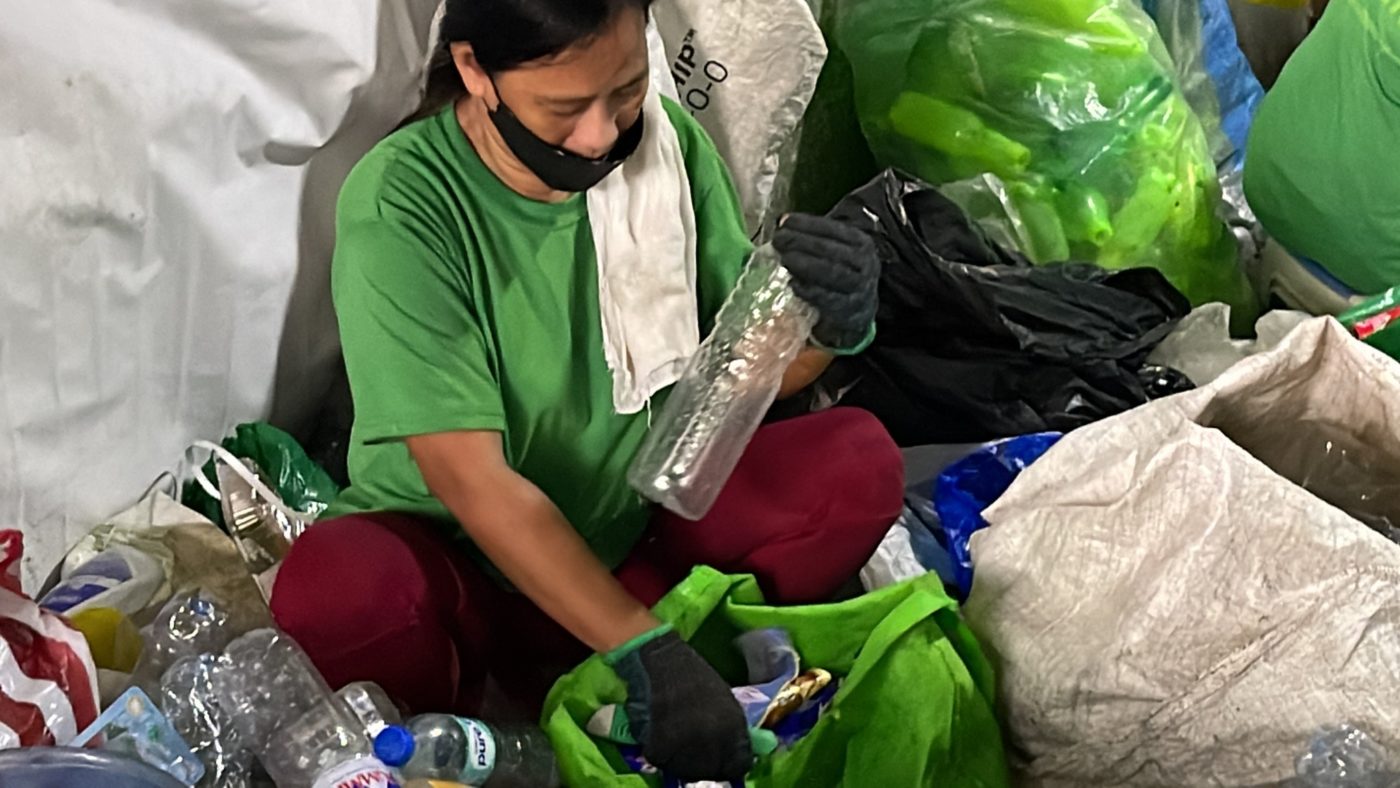
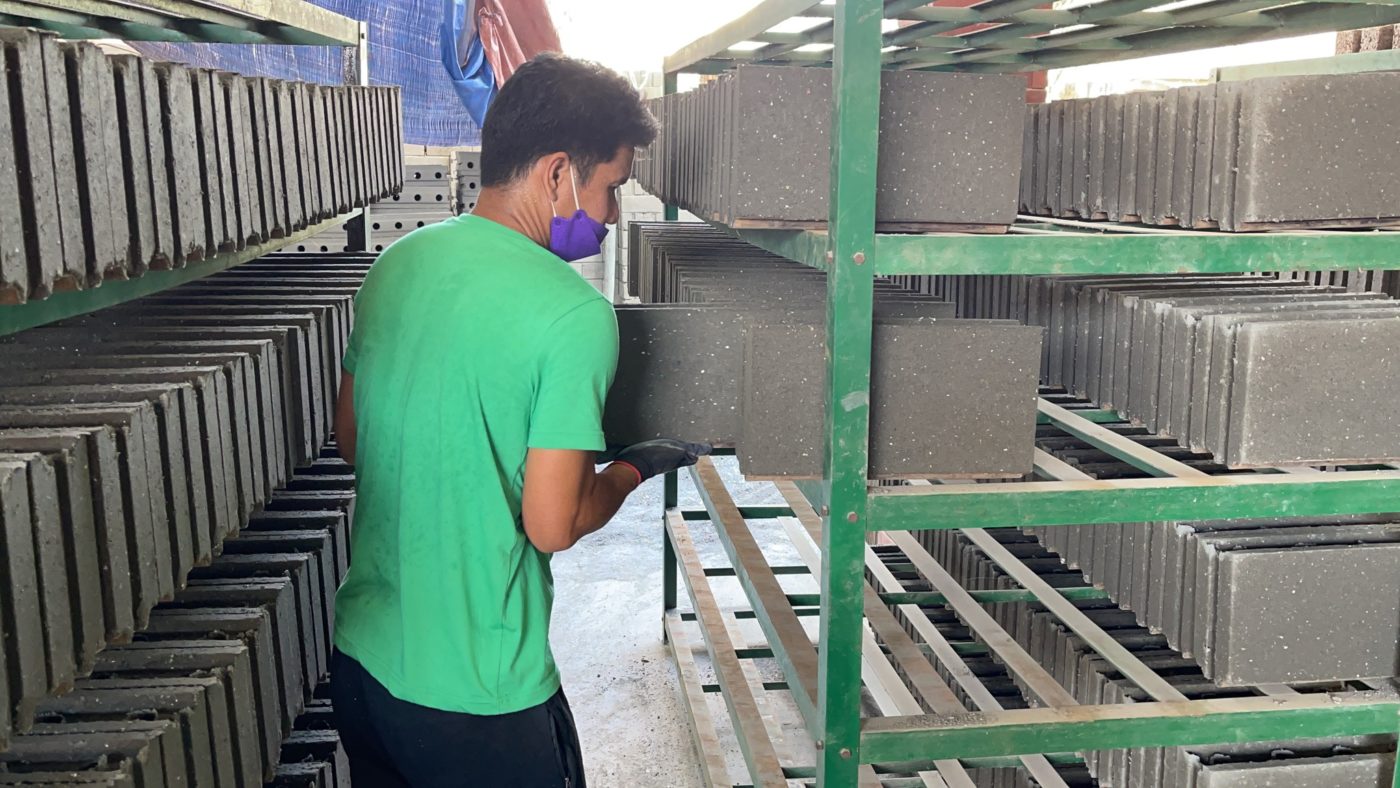
Tembo distribution partner network and geographic reach considerably expanded; additional commitments for 3,350 e-LV conversion kits. Toyota partnership cemented with a Design Services Agreement
Divestiture of non-core businesses in Aevitas to refocus on growth in Solar and key contract awarded on Edenvale Solar Farm
Cash balance at June 30, 2022 of $1.3m but increased to $8.9m post balance date following completion of divestitures and NASDAQ shelf issuance in July 2022
Annual group revenues (including discontinued operations in Aevitas) of $37.6 million down 3% on a constant AUD/USD FX basis
Underlying group EBITDA (including discontinued operations) declined to ($10.4) million from ($1.4) million in FY21, due to impacts of COVID lockdowns in key markets, especially Australia
Memorandum of Understanding (MOU) signed with state owned enterprise (SOE) in Jordan for 1,000 Tembo EV kits
VivoPower today announced its preliminary results for the fiscal year ended June 30, 2022.
Highlights for the fiscal year ended June 30, 2022:
A reconciliation of IFRS (“International Financial Reporting Standards”) to non-IFRS financial measures has been provided in the financial statement table included in this press release. An explanation of these measures is also included below, under the heading “About Non-IFRS Financial Measures.”
“The financial year ended June 30, 2022, was particularly challenging with numerous headwinds including strict COVID lockdowns in our key markets during the first half of the year, followed by supply chain shortages, extended logistics delays and COVID-19 related costs in the second half of the year which affected our ability to operate and deliver efficiently. Our financial results were as a consequence adversely affected, with revenues constrained and group operating losses exacerbated by a US$1.9m one off COVID driven loss in relation to the Bluegrass Solar project in Australia and foreign exchange. However, we did manage to execute on a number of important objectives in keeping with our strategic goals. This included securing a commercial definitive agreement with Toyota Australia, expanding our EV kit distribution network globally, adding further EV kit commitments and orders, as well as transitioning Tembo from a Netherlands centric operation to a business with an international mindset and presence with subsidiaries in Australia, the United Arab Emirates and Southeast Asia. Post balance date, we have been able to continue our execution momentum, including divesting of non-core business units in Australia, completion of a capital raising and signing our first EV kit memorandum of understanding in the Middle East. Furthermore, the tailwinds for our various business units have strengthened in the past few months, with developments such as the ratification of the Inflation Reduction Act in the United States and the added government impetus in Australia that is fuelling a record level of solar power development. No doubt, there will continue to be challenges to overcome in the short term, but we remain resolute as a team focussed on achieving our medium to long term strategic, financial and impact goals” said Kevin Chin, VivoPower’s Executive Chairman and Chief Executive Officer.
About Non-IFRS Financial Measures
Our preliminary results include certain non-IFRS financial measures, including adjusted EBITDA, adjusted net after-tax loss and adjusted EPS. Management believes that the use of these non-IFRS financial measures provides consistency and comparability with our past financial performance, facilitates period-to-period comparisons of our results of operations, and also facilitates comparisons with peer companies, many of which use similar non-IFRS or non-GAAP (“Generally Accepted Accounting Principles”) financial measures to supplement their IFRS or GAAP results. Non-IFRS results are presented for supplemental informational purposes only to aid in understanding our results of operations. The non-IFRS results should not be considered a substitute for financial information presented in accordance with IFRS, and may be different from non-IFRS or non-GAAP measures used by other companies.
The table included in this press release titled “Reconciliation of Adjusted (Underlying) EBITDA to IFRS Financial Measures” provides reconciliations of non-IFRS financial measures to the most recent directly comparable financial measures calculated and presented in accordance with IFRS.
| Year ended June 30 | ||
| Reconciliation of Adjusted (Underlying) EBITDA to IFRS Financial Measures (US dollars in thousands) | 2022 | 2021 |
| Net loss for the period | (21,569) | (7,958) |
| Income tax | (2,117) | (115) |
| Foreign exchange gains and losses | 4,709 | (2,093) |
| Interest income and expense | 3,894 | 2,504 |
| Non-cash share-based compensation | 1,900 | 1,078 |
| Restructuring and other non-recurring costs | 443 | 2,880 |
| Depreciation and amortization | 2,387 | 2,256 |
| Adjusted (Underlying) EBITDA | (10,352) | (1,448) |
The table included in this press release titled “Reconciliation of Adjusted (Underlying) net after-tax loss and adjusted (underlying) EPS to IFRS Financial Measures” provides reconciliations of non-IFRS financial measures to the most recent directly comparable financial measures calculated and presented in accordance with IFRS.
| Year ended June 30 | ||
| Reconciliation of Adjusted (Underlying) net after-tax loss and adjusted (underlying) EPS to IFRS Financial Measures (US dollars in thousands – except where indicated otherwise) | 2022 | 2021 |
| Net loss for the period | (21,569) | (7,958) |
| Restructuring and other non-recurring costs | 443 | 2,880 |
| Adjusted (Underlying) net loss for the year | (21,126) | (5,078) |
| Weighted average number of shares used in computing (loss)/earnings per share (shares) | 20,721,701 | 16,306,494 |
| Group Basic EPS (Statutory) (dollars) | (1.04) | (0.49) |
| Restructuring and other non-recurring costs per share (dollars) | 0.02 | 0.18 |
| Group Adjusted (Underlying) EPS (dollars) | (1.02) | (0.31) |
The table included in this press release titled “Profit and Loss Reconciliation from pre-divestiture basis to continuing operations” provides reconciliations of Total Group (including discontinued operations) financial measures to continuing operations financial measures.
| Profit and Loss Reconciliation from pre-divestiture basis to continuing operations (US dollars in thousands) | Total Group (pre-divestiture = Continuing + Discontinued) | Discontinued operations | Continuing operations |
| FY2022 | |||
| Revenue | 37,617 | 15,169 | 22,448 |
| Gross profit | 1,586 | 1,290 | 296 |
| Gross profit excluding Bluegrass COVID-related cost overruns | 3,467 | 1,290 | 2,177 |
| Profit / (loss) after tax | (21,569) | (369) | (21,200) |
| FY2021 | |||
| Revenue | 40,411 | 16,436 | 23,975 |
| Gross profit | 6,327 | 1,966 | 4,361 |
| Profit / (loss) after tax | (7,958) | (152) | (7,806) |
To read our full press release, and to keep up with all of VivoPower’s releases, visit the VivoPower Press Release page.
Contact
Investor Relations
VivoPower is pleased to announce that the Company and its wholly-owned subsidiary, Tembo e-LV B.V., have entered into a Memorandum of Understanding with a Jordanian Organisation to sell, distribute and market 4×4 Toyota vehicles which have been fully electrified by Tembo (Electrified Vehicles) and/or the Tembo electrification conversion kit for Toyota 4×4 vehicles (Conversion Kits).
Under the proposed agreement, the Jordanian Organisation intends to sell 1,000 Tembo e-LV conversion kits from execution of this agreement until 30th September 2027. The parties to the proposed agreement will work to finalise a Definitive Agreement as soon as practicable, and prior to 31st December 2022, unless the parties agree to an extension. All purchase commitments will be subject to the terms and conditions set forth in the Definitive Agreement.
In October 2021, VivoPower established itself in the United Arab Emirates (UAE) to extend its services to the Middle East and surrounding markets. Today’s announcement is the first significant agreement for the subsidiary and progression of the company’s growth strategy for the region.
Tembo’s conversion kits transform diesel-powered Toyota Land Cruiser and Hilux vehicles into ruggedised electric light vehicles for use in mining and other hard-to-decarbonise sectors. Tembo e-LV products are a key component of VivoPower’s turnkey net-zero solutions for the decarbonisation of corporate and public organisations.
Kevin Chin, Executive Chairman and CEO of VivoPower, said: “We are very pleased to move forward on gaining a new partner for Tembo in the region. This is in line with our strategy to expand our commercial activities and operations in the Middle East, the largest market for Toyota Land Cruisers in the world, and naturally follows the establishment of our local subsidiary for the region in the UAE in October last year. We look forward to cementing this partnership and servicing Jordan with our decarbonisation solutions.”
To read our full press release, and to keep up with all of VivoPower’s releases, visit our VivoPower Press Release page.
Arowana is pleased to announce that we have been recertified as a B Corporation, with an upgraded verified score of 138.8—significantly higher than our initial score of 84.2 in 2018!
As one of 5,470 certified B Corps in the world—and ranking us amongst the highest of B Corps globally—we are proud to be sustainability leaders who are committed to driving positive change using business as a force for good.
Our upgraded score reflects our continued efforts and commitment to improving our positive social, environmental, and economic impact for all stakeholders through our people, companies, and business practices.
This recertification is an important milestone for us as we continue to grow as a company and strive for greater levels of impact in the world.
Visit the Arowana website for more news and insights.

Arowana is pleased to announce that its education platform, EdventureCo, has been certified as a B Corporation by the global network, B Lab. The designation is a recognition of EdventureCo’s commitment to raising business standards and creating a positive impact on the life and livelihood of its communities through education.
As a Certified B Corp, EdventureCo joins a worldwide movement of over 5,000 for-profit companies, including Patagonia, Ben & Jerry’s, Education Perfect, Aesop, and Honest to Goodness, which uses business as a force for good.
EdventureCo is a premium provider of digital, soft, and future skills training that prepares the workforce of today for success tomorrow. The company operates six businesses – DDLS, Australian Institute of ICT, Auldhouse, ENS, Plain English Foundation and Everthought – whose training solutions enable learners to develop technical and human skills and, more importantly, unlock new opportunities for career growth in the changing world of work.
By upskilling today’s workforce, EdventureCo equips learners with competencies essential to thriving in a rapidly evolving future. The jobs of tomorrow will require talent that can quickly adapt to the complexities and disruptions of modern business. EdventureCo paves the way for organisations and individuals to stand on the forefront of change by empowering them with today’s most in-demand skills.
To become B Corp-certified, EdventureCo underwent B Lab’s B Impact Assessment (BIA), a rigorous assessment for benchmarking and enhancing a company’s impact performance in key areas such as governance, workers, community, environment, and customers. EdventureCo achieved an overall score of 88.5 points, well above the required score of 80 points for organisations seeking certification and above the average rating of 82.9 points for B Corp businesses in Australia.
Nicola Fowkes, EdventureCo’s General Manager of Operations, led the certification process and commented, “This is an important milestone for EdventureCo which confirms our business’s purpose of making a positive impact through education as well as our commitment to all stakeholders, especially our students, to deliver the skills they need for their future.”
“I am truly grateful for the work that has been done by Nicola and the EdventureCo team to reach this milestone. The B Corp certification process is not a pledge that you can simply sign up to – it is a serious, ongoing commitment. Any business that has chosen to go through the B Corp Certification process is required to dedicate significant resources and time. The BIA is a stringent and thorough assessment, and those companies that have attained certification should be proud of their commitment to strive for the triple bottom line,” said Benn Lim, Chief Operating & Impact Officer at Arowana.
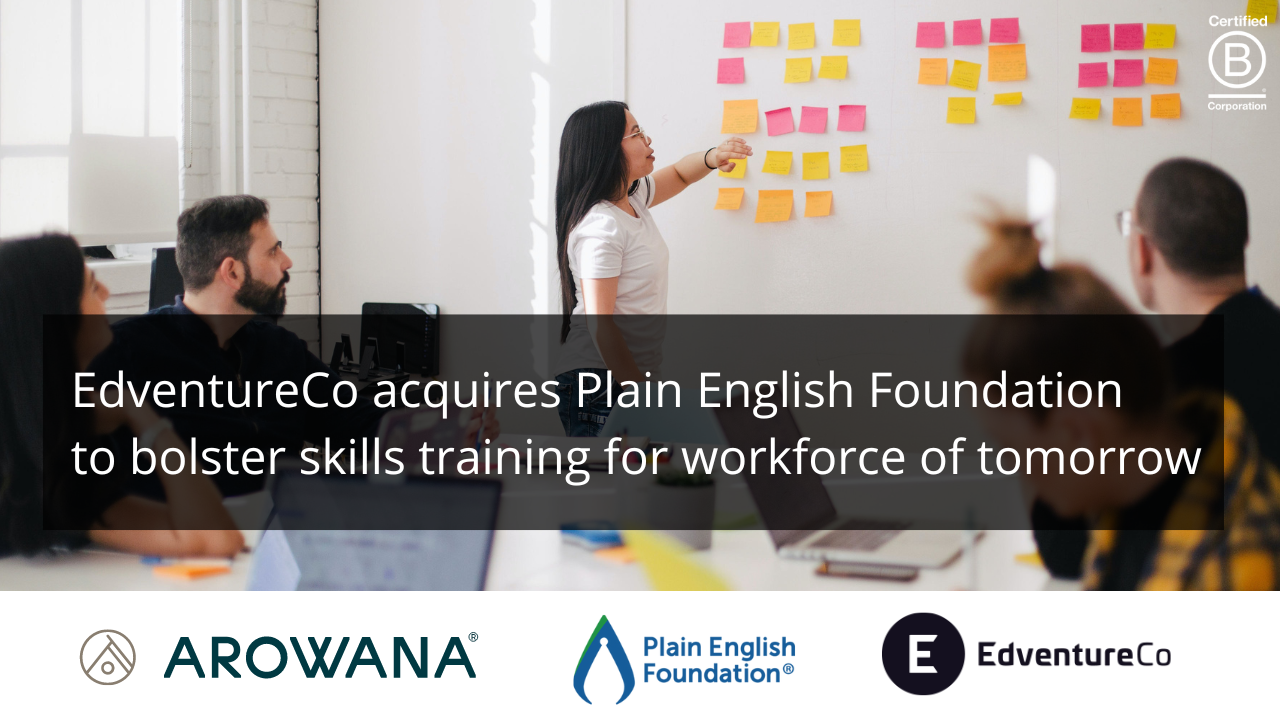
The Directors of AWN Holdings Limited (“Group”, “AWN”), which is part of Arowana & Co.
(“Arowana”) are pleased to announce that its education platform, EdventureCo, has completed the
acquisition of all the issued share capital of Plain English Foundation Pty Ltd (“PEF”) from its
founders.
PEF is Australia’s leading provider of clear communication training and editing services. Founded
by Dr Neil James and Dr Peta Spear, in the past 15 years PEF has trained over 30,000 professionals
and evaluated over 50,000 documents for more than 300 business and government organisations.
Based in Sydney, PEF has a blue-chip client base of government and corporates including the New
South Wales and Victorian Departments of Premier and Cabinet, University of New South Wales,
AIG, Aware Super, Savills Australia and TAL Services.
PEF was founded with the mission to improve the quality of public language by making clear,
concise communication a business and government standard. The business was instrumental in
establishing the international definition of plain language, which was officially adopted by the
International Plain Language Federation. Plain language is the ideal standard for all workplace
writing and public language because it is clear, precise, readable, usable and efficient.
With a recent survey by Deloitte Access Economics and Ipsos finding that three in four interactions
with government agencies now take place online rather than face-to-face or via the telephone, the
importance of clear written communication has never been higher.
The acquisition of PEF complements EdventureCo’s existing businesses and is consistent with
AWN’s strategy of building a premium provider of digital, soft and future skills training that
prepares the workforce of today for success tomorrow.
Carbon capture and storage (CCS) is a promising technology to getting the world to net-zero emissions. But what does it mean for investors?
Markets are increasingly betting that CCS will be an important part of the global net-zero transition, but investors must carefully consider the long-term risks and opportunities associated with CCS technology.
It's one thing to store carbon, and a whole other ball game to make use of it sustainably. Arowana's Santiago Tenorio-Garcés shared his perspective with MoneyWeek on the relevance of CCS, particularly for the decarbonisation of hard-to-abate industrial sectors like cement and steel production, highlighting the opportunities ahead from an innovation and project viability perspective “when firms find ways to use the carbon extracted, rather than just store it”.

Find out more about CCS technologies in "How to invest in carbon capture and storage in the quest for net-zero emissions" in the latest edition of MoneyWeek.
Atlas Iron is a leading iron ore explorer, developer, and producer based out of Western Australia
LONDON, June 30, 2022 (GLOBE NEWSWIRE) -- VivoPower International PLC (NASDAQ: VVPR, the “Company”) is pleased to announce that its wholly-owned subsidiary, Tembo E-LV, has secured an order for its EV conversion kits from Atlas Iron, a leading iron ore mining company based in Perth, Western Australia, and a subsidiary of Hancock Prospecting Pty Ltd (“HPPL”). Atlas Iron operates the Mt Webber, Sanjiv Ridge, and Miralga mines.
Under the leadership of the Executive Chairman, Gina Rinehart, HPPL is the most successful private company in Australia’s history, and one of the most successful private mining companies in the world.
Kevin Chin, VivoPower’s Executive Chairman and Chief Executive Officer, said: “We are delighted to be assisting Atlas Iron in their journey towards electrification and energy efficiency. With the opening of borders across Australia and Southeast Asia, we have been increasing our engagement with other groups and expect to be announcing additional orders in due course.”
About VivoPower
VivoPower is a sustainable energy solutions company focused on battery storage, electric solutions for customized and ruggedized fleet applications, solar and critical power technology, and services. The Company's core purpose is to provide its customers with turnkey decarbonization solutions that enable them to move toward net-zero carbon status. VivoPower is a certified B Corporation with operations in Australia, Canada, the Netherlands, the United Kingdom, the United States, and the United Arab Emirates.
Forward-Looking Statements
This communication includes certain statements that may constitute “forward-looking statements” for purposes of the U.S. federal securities laws. Forward-looking statements include, but are not limited to, statements that refer to projections, forecasts, or other characterizations of future events or circumstances, including any underlying assumptions. The words “anticipate,” “believe,” “continue,” “could,” “estimate,” “expect,” “intends,” “may,” “might,” “plan,” “possible,” “potential,” “predict,” “project,” “should,” “would” and similar expressions may identify forward-looking statements, but the absence of these words does not mean that a statement is not forward-looking.
Forward-looking statements may include, for example, statements about the achievement of performance hurdles, or the benefits of the events or transactions described in this communication and the expected returns therefrom. These statements are based on VivoPower’s management’s current expectations or beliefs and are subject to risk, uncertainty, and changes in circumstances.
Actual results may vary materially from those expressed or implied by the statements herein due to changes in economic, business, competitive, and/or regulatory factors, and other risks and uncertainties affecting the operation of VivoPower’s business. These risks, uncertainties, and contingencies include changes in business conditions, fluctuations in customer demand, changes in accounting interpretations, management of rapid growth, intensity of competition from other providers of products and services, changes in general economic conditions, geopolitical events, and regulatory changes, and other factors set forth in VivoPower’s filings with the United States Securities and Exchange Commission. The information set forth herein should be read in light of such risks. VivoPower is under no obligation to and expressly disclaims any obligation to, update or alter its forward-looking statements whether as a result of new information, future events, changes in assumptions, or otherwise.
Contact
Shareholder Enquiries
Media Enquiries
Sophie Morello / Jessica Hodson Walker / Richard Bicknell